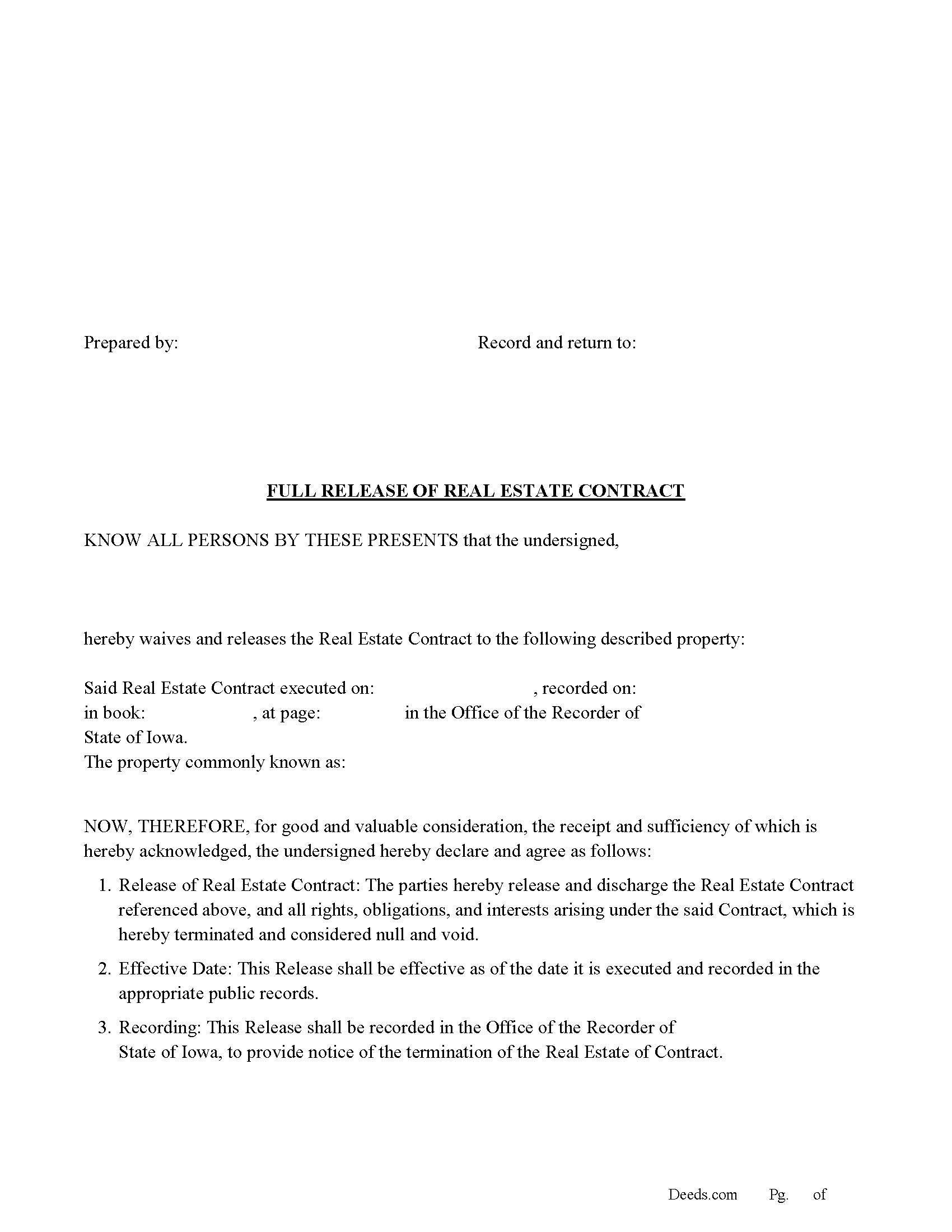Iowa Full Release of Real Estate Contract Forms

Iowa Full Release of Real Estate Contract Overview

How to Use This Form
- Select your county from the list on the left
- Download the county-specific form
- Fill in the required information
- Have the document notarized if required
- Record with your county recorder's office
Iowa Code 558.46 primarily addresses the mandatory recording of residential real estate installment sales contracts (commonly known as contracts for deed or land contracts). This law has implications for both the initial recording of these contracts (or a memorandum of the contract) and the release of such contracts once their terms are fulfilled or terminated.
Here’s how Iowa Code 558.46 affects the recording of a release of contract:
1. Recording a Release of the Contract (or Memorandum):
When the installment sales contract is fulfilled (i.e., the buyer completes all payments and other contractual obligations) or terminated (if the parties mutually agree to end the contract early), a Release of Contract or a Release of Memorandum of Contract must be recorded. The process and obligations for recording a release are influenced by Iowa Code 558.46 in the following ways:
Release of Buyer’s Interest: Once the contract has been fulfilled or terminated, the seller must execute a release to formally release the buyer’s interest recorded under the contract or memorandum. Recording a release clears the property title of the buyer’s claim or interest, ensuring that the property’s record reflects the new, accurate status (whether ownership has been transferred to the buyer or the contract was terminated).
Clearing the Public Record: Just as the contract or memorandum must be recorded to give public notice of the buyer’s interest, the release must also be recorded to update the public record and ensure that no ongoing encumbrance or claim related to the installment contract remains on the property title.
-If the buyer has completed the contract (i.e., all installment payments and obligations are met), the release confirms the transfer of full title to the buyer.
-If the contract has been terminated (either by mutual agreement or default), the release serves to remove the memorandum of contract from the public record.
Seller’s Responsibility: According to 558.46, the seller is responsible for recording the original contract or memorandum. Similarly, the seller is typically responsible for recording the release of contract upon fulfillment or termination of the agreement. Failure to do so could leave the property’s title clouded or encumbered, potentially complicating future transactions.
-Sellers should ensure timely recording of the release to avoid legal disputes, title issues, or claims of breach of contract by the buyer.
Buyer’s Right to Protect Their Interest: While 558.46 places the obligation of recording on the seller, buyers also have an interest in ensuring the contract or memorandum is recorded (initially) and released (upon fulfillment or termination). If the seller fails to record the release, the buyer may take action to record it to protect their interest in the property or to clear their name from any continuing liability under the contract.
2. Legal and Practical Implications of Non-Compliance:
Non-compliance with the mandatory recording requirements under 558.46—whether it involves recording the original contract, memorandum, or the release—can have several consequences:
Legal Penalties: If the seller fails to record the initial contract or a release upon fulfillment or termination, they may face legal penalties. Under Iowa Code, sellers can be fined or held liable for damages resulting from a failure to record.
Clouded Title: If the release is not recorded, the buyer's interest in the property may still appear on the public record, creating a cloud on the title. This can prevent the seller from selling or refinancing the property in the future or complicate the buyer’s ability to sell the property after fulfilling the contract.
Title Insurance Issues: Title insurers may refuse to issue a clear title insurance policy if the contract for deed or memorandum is still on record without a corresponding release. This can delay or prevent the sale of the property.
Third-Party Claims: Failure to record a release may leave the property vulnerable to third-party claims or liens, as the public record still reflects that the installment sales contract is in effect.
3. Ensuring a Proper Release:
To properly release a memorandum of contract or the entire contract, the following steps should be taken:
Prepare the Release of Memorandum of Contract: The release document should include references to the original memorandum of contract (e.g., names of the parties, the date of the contract, and the legal description of the property) and should state that the contract has been fully performed or terminated.
Signatures: The release should be signed by the seller (and in some cases, both parties) and notarized.
Record the Release: The release must be filed with the county recorder’s office where the original memorandum of contract was recorded. This clears the property’s title and removes any record of the buyer’s interest in the property.
Important: County-Specific Forms
Our full release of real estate contract forms are specifically formatted for each county in Iowa.
After selecting your county, you'll receive forms that meet all local recording requirements, ensuring your documents will be accepted without delays or rejection fees.
How to Use This Form
- Select your county from the list above
- Download the county-specific form
- Fill in the required information
- Have the document notarized if required
- Record with your county recorder's office
Common Uses for Full Release of Real Estate Contract
- Transfer property between family members
- Add or remove names from property titles
- Transfer property into or out of trusts
- Correct errors in previously recorded deeds
- Gift property to others